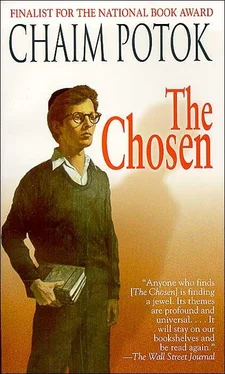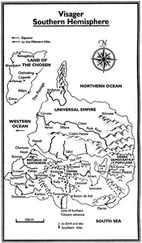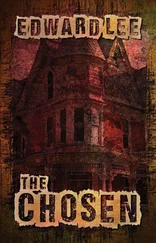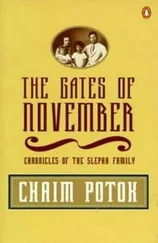In the middle of a heated debate over an impossible passage in Kiddushin I heard Danny take a sudden loud breath, as if he had been punched in the stomach. Reb Saunders and I broke off our discussion and looked at him. He was staring down at the Talmud, and smiling. His face had come to life, and there was a light in his eyes. He jumped up from his chair, circled the room, then sat down again, and Reb Saunders and I just sat there, staring at him. Something is the matter? Reb Saunders wanted to know. There is a joke in the Talmud we did not see? What was so funny? Danny shook his head, still smiling, bent over the Talmud, and began to give his version of the passage. His voice trembled a little. There was a pause when he finished, and I thought for a moment that Reb Saunders would again ask his son what had been so funny. Instead, I heard him sigh a little, then offer a passage from the Baba Bathra that contradicted Danny's explanation. We returned to the battle, and Danny more than made up for his previous silence.
He was quiet as he walked me part of the way home that night, and when we got to the synagogue where my father and I prayed he muttered something about seeing me in the library the next day, then turned and went quickly back.
When I got to the library the next afternoon, I found him seated at his table. There were three books open in front of him. He smiled broadly and waved me to a chair. He had worked out a method of doing Freud, he said, and it seemed to be going all right, so far. He pointed to the three books. One was a volume of Freud's early papers, he told me. Some of them Freud had written together with Josef Breuer, a Viennese physician; others he had written alone. Another was the Cassell's German-English Dictionary. The third was a dictionary of psychological terms edited by someone called Warren. The Freud volume was open to a paper entitled 'Ein Fall Von Hypnotischer Heilung'. Fall meant 'case', he said. The rest of the title I could figure out for myself from my Yiddish, he told me.
'I forgot what it was like to study Talmud.' he said excitedly. 'Talmud is so easy for me now, I don't remember what I used to go through when I first started it as a kid. Can you study Talmud without the commentaries? Imagine Talmud without Rashi. How far would you get?'.
I agreed with him that I wouldn't get very far at all.
He had been going at it all wrong, he said, his eyes bright with excitement. He had wanted to read Freud. That had been his mistake. Freud had to be studied, not read. He had to be studied like a page of Talmud. And he had to be studied with a commentary.
But Danny didn't know of any commentaries on Freud, so he had settled for the next best thing. He had needed something that would explain Freud's technical terminology, that would clarify the various shades of meaning the German words had and he had found this dictionary of psychological terms. He was reading Freud now sentence by sentence. He didn't go on to the next sentence until the prior setence was perfectly clear in his mind. If he came across a German word he did not know, he looked up its English meaning in the Cassell's. If the Cassell's gave him a translation he didn't understand, one that wouldn't fit the meaning of the sentence, he looked the English word up in the psychology dictionary. That psychological dictionary was his commentary. It had, for example, already explained to him the technical difference between 'fear' and 'fright'. It had also explained the term 'cathexis'. It was working. He had already studied two and half pages that afternoon.
Was Freud worth all that effort? I wanted to know.
Freud was a genius, Danny told me. Of course he was worth all that effort. Was symbolic logic worth all my effort?
I had nothing to say to that, except admit that he was probably right.
So I continued reading the Langer book, while Danny bent over the table studying Freud. He shuffled pages impatiently whenever he had to look something up in one of his dictionaries. The sounds of the shuffling pages were loud in the silence of the library…
On Thursday, I told him that my father and I would be leaving next Tuesday morning for the cottage near Peekskill where we always stayed in August, and I gave him two books I thought he might like to read. One was The Making of the Modern Jew by Milton Steinberg, the other was The Thirteen Letters of Ben Uzziel by Samson Raphael Hirsch. He thanked me and said he would read them. When my father and I left for Peekskill on Tuesday morning, Danny had completed the first paper and was started on the second, entitled 'Die Abwehr-Neuropsychosen'.
We had agreed not to write to each other:… probably out of an unspoken feeling that two boys our age writing one another when we were only going to be separated for a month was a little childish – and I didn't see him again until after Labor Day.
My father and I returned home the day after Labor Day, and I called Danny immediately. His mother answered and told me she was delighted I had had a good vacation but she was sorry, Danny wasn't home, he had gone with his father to visit a family friend in Lakewood. Danny called me later that evening, happy to hear I was back. He had missed me, he said. How was the trip to lakewood? I wanted to know. Miserable, he said. Had I ever sat in a bus with my father for hours and not exchanged a single word of conversation, except for a short discussion about a passage of Talmud? No, I told him quietly, I had never had that kind of experience. I always talked to my father. I was lucky, he said. I didn't know how really lucky I was, he added, a little bitterly.
We chatted for a while, and agreed to meet in the library the following afternoon. I found him at his table, looking a little pale, but happy. His tufts of beard had grown a bit thicker, he blinked his eyes a little too often, as if weary from all his reading, but otherwise he was the same, everything was the same, and it was as though we had not seen each other for, at most, a single night of dream-filled sleep. Yes, he had read the two books I had given him. They had been very good, and he had learned a lot from them about the problems of contemporary Judaism. His father had thrown some poisonous looks at him when he had taken them into the house, but the looks had disappeared when Danny had somehow gotten up the courage to tell him that the books had come from Reuven Malter. He would give them back to me tomorrow. He had also read a great deal of Freud, he said. He had finished almost all of the first volume, and he wanted to talk to me about a paper of Freud's called 'Die Sexualitiit in der Atiologic. der Neurosen'. It had been something of a shock to him to read that, he said, and he had no one else to talk to about it except me, he didn't want to discuss it with my father. I said fine, we could talk about it on Shabbat when I came over to his house.
But somehow we never got around to talking about it that Shabbat, and on Sunday morning we were both back in school again. The year – the real year of a person going to school – began and for a long while I had no time at all to think about, let alone discuss, the writings of Sigmund Freud.
For the first two months of that school year, Danny and I were able to get together regularly only on Shabbat afternoons. Only once did we manage to see each other during the week. I had been elected president of my class, and I found myself suddenly involved in student politics. The evenings that I might have spent with Danny I spent instead at student council or committee meetings. We talked frequently by phone, though, and neither of us felt our friendship was suffering any. But we never got around to discussing what he was reading in Freud.
During November, I managed to go over to his house one evening in the middle of the week. I brought him half a dozen books on Jewish subjects that my father had suggested he read, and he thanked me for them gratefully. He looked a little weary, but otherwise he was fine – except for his eyes, which tired easily, he said. He had been to a doctor, but he didn't need glasses, so everything was really all right. I asked him how he was coming along with Freud, and he said, looking uncomfortable, that he was rarely in the library these days, there was too much schoolwork, but he did manage to read a little of Freud now and then, and it had become very upsetting.
Читать дальше












